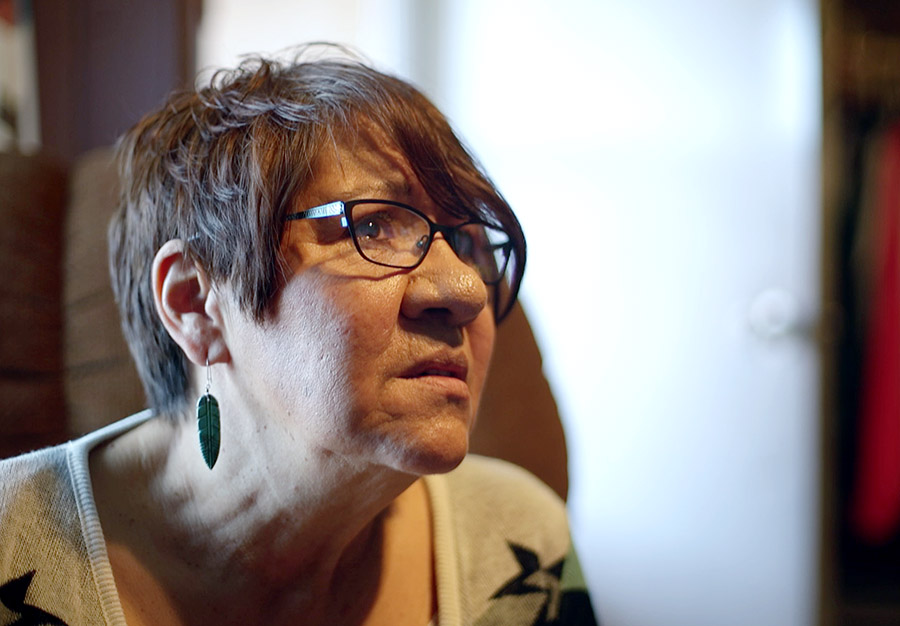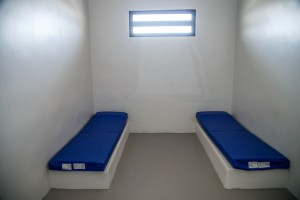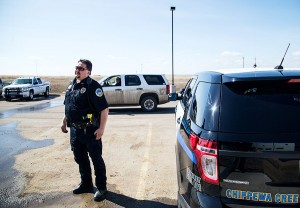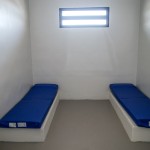DREAMING OF DETENTION: Overcoming the limits of federal funding on the Rocky Boy’s reservation
Story by Jordon Niedermeier
Photos by Tommy Martino
IT WAS midnight in the parking lot of a Billings Walmart. The night air chilled Sue LaMere’s Ford Taurus. She didn’t have a blanket to share with her daughter, so she cranked the ignition to blast the heat. It was all she could do to make her 12-year-old girl more comfortable.
LaMere couldn’t sleep. Cramped in the driver’s seat, her mind was fixed on the trip’s misery.
The Ford blew a tire during the 350-mile journey from the Rocky Boy’s Indian Reservation. With no other options, she called a roadside tire service and it took all the money she had to get it moving again.
Then the car broke down a second time. It had to be towed to a garage in Miles City. The parts alone cost more than $400. The bill forced LaMere to call her ex-husband for money so she could continue on the road.
This was LaMere’s first trip to visit her son, Jared, who was locked up in a juvenile detention center in Busby, Montana. She declined to talk about the crime that sent him away. Instead she focused on the situation. He was her son, he was 15 years old, and she had to see him. He had not yet earned phone privileges, so contact with family was limited to weekend visits.
The drive to the Northern Cheyenne Youth Detention Center should have taken less than seven hours. It took LaMere four days. And yet, just 10 minutes into her drive on the Rocky Boy’s Indian Reservation, Lamere passed a brand new juvenile detention facility that could have housed her son.
She lamented the irony of her position as she passed by the building, unaware of how long her trip was going to be. She knew that even though part of the structure was built to hold juveniles, the Chippewa Cree couldn’t afford to staff it.
After obtaining a $12.3 million federal grant in 2009, the tribe built a new justice center, consisting of tribal police headquarters, an adult jail and a juvenile detention center. However, the progress stopped there as the tribe failed to secure funds to actually run the detention center.
While adult inmates and the Rocky Boy’s Police Department have called the facility home since 2012, not a single juvenile has spent a night there. Instead, they’re still sent to Great Falls, about two hours away, or Busby, seven hours, depending on the length of their incarceration.
The Rocky Boy’s Indian Reservation, which is as economically challenged as most tribal nations, has managed to secure a considerable amount of funding from outside grants to pay for programs and much needed infrastructure, like constructing a juvenile detention wing.
However, maintaining those grants, finding money to run the juvenile detention wing, requires creativity in both tribal planning and grant writing. On that end, the Chippewa Cree tribe has had trouble keeping up with its own successes.
LaMere said she harbors resentment because she wants to be there for her child, to see him as much as possible.
“It bothers me that we have a facility sitting there. Which I think if you’re in the business sense, you anticipate and project the cost that it would take to operate the facility,” LaMere said. “You should have appropriated the money or planned for the money and figured out the cost when you were building it. That’s just part of business management.”
JIM SWAN, a resident and enrolled Chippewa Cree tribal member, is the chief executive officer of RJS & Associates, a grant-writing and management firm in Box Elder. He also works closely with the Chippewa Cree Business Committee, the tribe’s governing body, to find the outside funding necessary to maintain services in a challenged economy.
Every morning Swan grabs a cup of coffee and prints off what he calls his “daily digest,” a list of every federal grant that’s open for application. Then he sits behind a U-shaped desk and scans the papers for answers to his community’s prayers.
Swan moved home to Montana after living in Illinois and attending graduate school at the University of Chicago. He withdrew before receiving a degree, but it was in that city that his career in grant writing started. Twenty years later, he’s the CEO of the company his father started.
Like most tribes, the Chippewa Cree rely heavily on federal grants to pay for everything on the reservation their operating budget can’t cover. But resident grant writers like the ones working at RJS & Associates are an unusual occurrence on a reservation.
Jim Swan is an asset to the community, and he knows it.
“Rocky Boy is lucky to have us here. We’ve been very successful for our tribe, our school district, our college. We’ve helped out other reservations, but just the fact we’re based physically here really helps our tiny reservation,” Swan said.
Since 1996, the firm secured more than $300 million in grants. Much of that money went to Rocky Boy’s. They’ve funded programs like the drug court, creating an option for drug offenders to receive treatment over incarceration. The firm also helped create a recreation center and found grants to construct the justice center.
“A lot of the time, our clients just know: ‘We have this issue, and we have some sort of vague ideas how we might tackle it,’” Swan said.
Swan takes those ideas and formulates a concrete plan with goals and objectives and sees the project through to the point of evaluating how effective it was after implementation.
IN 2009, RJS helped the Chippewa Cree tribe secure the federal grant to build the new detention facility and police headquarters. The tribe also used more than $1 million of its own money to construct the new Chippewa Cree Tribal Justice Center.
According to tribal officials, when the tribe applied for the grant that paid for the construction of the justice center, the Chippewa Cree planned on receiving the operating money for the facility from the Bureau of Indian Affairs. However, they only received a third of what they expected.
The center consists of two wings that are nearly identical. Each side has 18 cells, nine for men and nine for women, with a concrete slab topped with a thin pad for a bed, a stainless steel toilet and sink, and a mirror bolted to the wall.
Sue LaMere toured the building after construction and has seen where Jared could have spent his time.
LaMere’s son could have played cards on a concrete picnic table in a communal area that occupies the space between the cells and the outer secure wall. Inmates are allowed to socialize there, and he would have been with people from his community.
 He could have eaten meals from the full kitchen and played basketball in the justice center’s indoor recreation room.
He could have eaten meals from the full kitchen and played basketball in the justice center’s indoor recreation room.
LaMere also saw the visitation area, a room, just minutes from her home, that she said would have benefited her son more than anything.
Jared has been detained on the Northern Cheyenne reservation for more than two years.
At first LaMere tried to visit him every couple weeks, depending on her finances. It was difficult telling her son she couldn’t make it if he asked her to come when he had a hard week.
“You don’t want to tell your kid that’s in jail, incarcerated, that you can’t come down because you don’t have the money,” LaMere said. “We have to figure out, like, I’m going to skip this bill this month because I need to be there for him.”
Now she visits about once a month and makes sure she has extra funds to cover any emergencies.
AN EMPTY juvenile detention center could say good things about a community. All the children obey the law and their parents. They go to class and they never drink, smoke, or mess with drugs. But in Rocky Boy’s, they export their troubled youth.
The grant covered only construction costs. Operational expenses seem to have been overlooked. The tribe still has not managed to find a way to pay for staff because of the more extensive needs of juvenile detention.
The tribe would have to pay for education programs and hire tutors. Corrections officers would be required to undergo additional training to monitor minors. The facility would also need trained, specialized counselors.
The jail sits empty because the tribal government can’t afford the required personnel.
LaMere lost contact with her son even before he was sent to Busby to serve his sentence.
Steve Henry, lieutenant of operations of the Rocky Boy’s Police Department, said children charged with serious crimes are sent to the nearest active detention center in Great Falls, 100 miles and nearly two hours away.
Sometimes, youths are handcuffed to chairs for up to four hours, waiting to be transported.
Sending juveniles to Great Falls does not come free either. According to Henry, it costs the tribe $210 for every day the child is detained.
Henry said his daughter was sent to Great Falls juvenile detention center before being held in Busby.
He said she faced racial prejudice by some of the staff members there and he questions the qualifications and knowledge of the people providing treatment.
Russell Hoell considers himself a full-time activist and was once a court advocate in Rocky Boy’s. He has had two children go through the juvenile criminal justice system, and he said the Great Falls detention center is not a good place for Chippewa Cree youth.
According to Hoell, the officers there don’t know the children under their supervision.
He said there are multiple self-identifying gangs on Rocky Boy’s, and when they get sent to Great Falls, that is not taken into consideration. When they are detained in the same holding areas, violence can break out, according to Hoell, who said his son was a member of one of the gangs.
The Great Falls Juvenile Detention Center is the closest option for the Rocky Boy’s Police Department, but in some cases, they have no option at all.
Police in Rocky Boy’s can’t detain minors arrested for possession of controlled substances or intoxication. Great Falls won’t accept juveniles for such small offences. Juveniles frequently skip court dates and because of existing tribal laws they aren’t punished.
Henry said this is all well known on the reservation, and juveniles take advantage of it.
Tribal police can’t hold intoxicated children at the justice center long enough to sober up, and Henry said the department is forced to release them back to the same environment that caused the initial arrest. Sometimes that leads to a juvenile being arrested multiple times in one day.
“I’ve taken a kid home, I dropped her off,” Henry said. “(I) stood there at the door, said, ‘You going to go in and go to bed?’ She said, ‘Yeah, I’ll behave.’ Got in my vehicle, got to the end of the block, and dispatcher is sending me right back to the house because she’s fist-fighting with mom.”
ROCKY BOY’S Business Council member Dustin Whitford said the tribe doesn’t even want to use the word detention when describing the new facility. He said the focus should be on treatment and recovery for mental health and addiction.
Sue LaMere’s son is set to be released this month but she said he could have benefited from time spent in the facility Whitford imagines.
After his incarceration, he was counseled for anger management issue,s and doctors have diagnosed him with ADHD and bipolar disorder. LaMere said the diagnoses changed frequently and it created frustration for her family. She never spoke to his health care providers because of the distance. She felt disconnected from his treatment.
Lenore Myers-Nault is the director of White Sky Hope Center, an addiction treatment center on Rocky Boy’s. She said families can sometimes become a barrier in the rehabilitation process for teens, but family support is vital for success.
 While she thinks incarceration is more harmful than helpful for less severe offenders, she said it can be productive for troubled youth who lack support from their families.
While she thinks incarceration is more harmful than helpful for less severe offenders, she said it can be productive for troubled youth who lack support from their families.
“We’re not focusing on jail-based programs, but it’s hard to get people through the door,” Myers-Nault said. “The families are like, ‘I don’t want my children in jail, but they’re still dealing with addictions.’”
Although Myers-Nault said White Sky has no communication with the justice center regarding juvenile services, she does have staff trained to work with youth.
Whitford said providing the services in-house would also allow them to incorporate cultural aspects in their treatment. Even though the Busby juvenile detention center is located on a reservation, it’s a different tribe and that needs to be considered because there are different customs and beliefs.
LaMere thinks the distance from his family has been more difficult for him than anything and hindered his long-term goals. His grandmother is ill, and because of the distance, he never gets to see her.
“He shouldn’t have had to go to all these places and be incarcerated somewhere when we have our own facility that’s here. You know we don’t have the money to run it, we don’t have the trained staff to do it, but if he had been here at least he would be with our own people,” LaMere said.
“I think he could get more help. He would be more comfortable. He would be, I guess, calmer. Calmer because his family would be around him and he would not have the loneliness that he has to live with.”
JIM SWAN said programs without self-supporting business plans often die when the federal dollars stop coming in. Developing a plan to keep programs running after their grants end has become more important to getting funding in recent years.
“We have to think about sustainability three years down the road, five years down the road, knowing full well things are going to change,” Swan said.
According to him, the state of economy and changing project leadership are two of the biggest factors that lead to changes in available financing. He has to “look through a crystal ball” when he writes an application and try to predict how the tribe can get through unforeseen obstacles.
When the tribe realized it would not have enough money to operate the juvenile facility, it was left scrambling for a shot in the arm. They identified and applied for a grant with the potential to open the juvenile wing of the justice center.
Beau Mitchell, the Rock Boy’s planning and development director, said the Edward Byrne grant is highly competitive but could get the ball rolling on a path to the center’s sustainability. He said getting the money to open the facility would create possible revenue streams that could at least partially cover its operational costs.
Like Jim Swan, Mitchell left the reservation to pursue his education but came back to make a positive impact on his community.
The business council called on him to find ways to free up money for the tribal services, and he decided to take a progressive approach.
“They asked how they could make cuts. Instead, I looked how to make revenue,” Mitchell said.
Mitchell wrote a business plan outlining steps the tribe can take to make the juvenile detention center self-sustaining. He said instead of paying to send kids to Great Falls, they can open their facility to neighboring reservations.
“It’s conflicting because your operation is contingent on people committing crimes,” Mitchell said.
But he thinks that it makes good business sense. The tribe can offer a service and make it the best available by having a convenient location and offering higher quality treatment by incorporating other tribal entities like White Sky Hope Center.
“We have all the pieces here. We just need to organize them and put them together,” Mitchell said.
According to Swan, programs with measurable success, like graduation rates or recidivism reduction, have a better chance at survival even if they aren’t self sustaining. He can use that data to make an application for another grant more competitive.
If Rocky Boy’s juvenile detention center opens, the success of the facility and its programs will improve its odds at receiving future grant money, thereby making services sustainable, if not grant free, in Swan’s opinion.
“The best way I’d like to approach the section of sustainability on the front end really doesn’t fly so well, but we’re going to come back and ask you for another grant. If we’re telling the truth, that’s likely what we’re going to do.”
- The juvenile detention center sits empty not because of lack of crime, but because of lack of funding. Jim Swan, his late father Robert Swan and their grant writers secured $12.5 million of the $14 million required to build the structure, but it was not enough to run the entire center. The tribe managed to open the adult side using their compact dollars.
- The closed juvenile detention center also affects family members of the juveniles, such as Sue Lamere. Her son, Jared, committed a more serious offense, so the tribal courts decided he needed to be incarcerated for a longer period of time. Her son has spent the last two years in a Bureau of Indian Affairs’ facility in Busby, seven hours away on the Northern Cheyenne Indian Reservation.
- James “Jim” Swan is the CEO of RJS & Associates, a small grant-writing firm that’s based out of a modest house near Rocky Boy Agency. Swan and his grant-writing team have brought more than $300 million to the Chippewa Cree tribe.
- The Chippewa Cree Tribal Justice Center opened in 2012 and cost nearly $14 million to build. The center was designed to house 30 adults and 18 juveniles, along with the Rocky Boy’s Police Department.
- Steve Henry, lieutenant of operations for the Rocky Boy’s Police Department, and fellow officers have to deal with the consequences of a non-functioning juvenile detention center on a daily basis. Juveniles have caught on to the fact that if they cooperate with the office, they are merely cited and can evade detention.
- Roland Nez, the adult probation officer for the Chippewa Cree tribe, says hello to an inmate on the adult portion of the detention center. Nez is the tribe’s only adult probation officer, so he has made contact with almost every person that is incarcerated.
- Roland Nez holds his head in frustration after speaking with one of his clients. Being the tribe’s sole adult probation officer takes a lot of time and effort. “I was already overwhelmed when I started, and I have already asked if they can hire another [probation officer], but they just can’t because of the budget,” said Nez.
- Roland Nez tries to get his kids ready for school before he drives to the Rocky Boy’s Indian Reservation. He is the sole adult probation officer for the Chippewa Cree tribe.
- Sue Lamere said it became expensive for her to visit her son when he was sent 400 miles away to the BIA detention center in Busby. The trip was also plagued with car troubles and long nights sleeping in parking lots.
 Native News Project 2014 | School of Journalism – University of Montana Native News Project 2014
Native News Project 2014 | School of Journalism – University of Montana Native News Project 2014





![Roland Nez holds his head in frustration after speaking with one of his clients. Being the tribe’s sole adult probation officer takes a lot of time and effort. “I was already overwhelmed when I started, and I have already asked if they can hire another [probation officer], but they just can’t because of the budget,” said Nez.](http://nativenews.jour.umt.edu/2014/wp-content/uploads/2014/05/RB_RGB_07-150x150.jpg)




Recent Comments